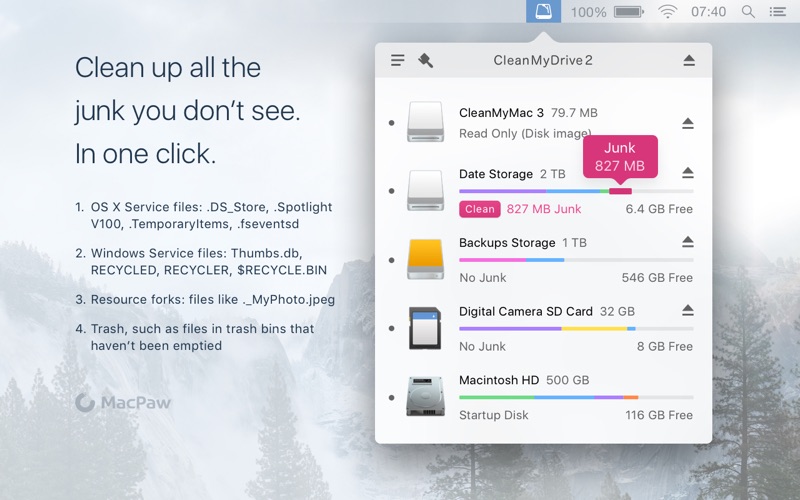
CleanMyDrive 2
About CleanMyDrive 2
CleanMyDrive 2 is a lightweight disk manager for external and internal drives. It provides quick access to any drive with detailed information on space usage, and cleans hidden junk from external disks. It’s lightning fast and easy to use, with a convenient interface that opens right from the OS X menu bar. CleanMyDrive 2 is the new, improved version of CleanMyDrive, with a beautiful makeover and a whole set of new features.
“...A cute little companion to ease up your workflow.” – MacStories
"...A nifty utility for people who want an easier way to manage drives." – MacWorld
"...Just let it run in the background and keep your drives from accumulating junk." – LifeHacker
“I can’t see any reason for you to not install it.” – AppShopper
“The app is super simplistic.” – Cult of Mac
“It makes storage-related chores a breeze.” – Softpedia
With CleanMyDrive 2, you’ll be able to:
Prevent issues with external drives after using them on other operating systems.
Keep your external drives safe, even when you close your MacBook and unplug them without ejecting in advance.
Easily manage storage by knowing the types of files on your drives and how much space they take up.
Quickly copy files to any drive by dragging them right into the app.
Save time by ejecting all drives with one click or using a global shortcut.
Choose a hand-crafted icon for each drive to make it look amazing.
What kind of junk does CleanMyDrive 2 get rid of?
1. OS X Service files: .DS_Store, .Spotlight-V100, .TemporaryItems, .fseventsd
2. Windows Service files: Thumbs.db, RECYCLED, RECYCLER, $RECYCLE.BIN
3. Resource forks: files like ._MyPhoto.jpeg
4. Trash, such as files in trash bins that haven’t been emptied.
Why should these files be removed?
Service files created by OS X and Windows could corrupt your external drive’s compatibility with other devices. For instance, your camera slows down if the SD card has hidden system files. And, they spoil your experience by cluttering the main folder of your disks.
You see resource forks when you’ve stored files on your USB stick and want to use them on other devices, such as your TV or car audio system. These devices can’t actually read them, but display them in the folder all the same. You have to scroll through them before you get to the files you actually need.
Finally, trash from the bins simply takes space on your drives. And who doesn’t need a little extra disk space?
















